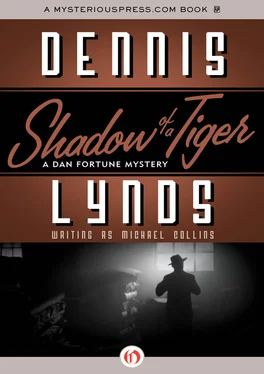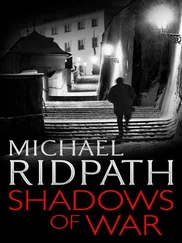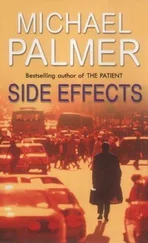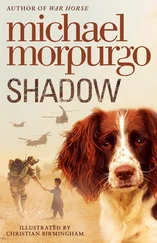Michael Collins - Shadow of a Tiger
Здесь есть возможность читать онлайн «Michael Collins - Shadow of a Tiger» весь текст электронной книги совершенно бесплатно (целиком полную версию без сокращений). В некоторых случаях можно слушать аудио, скачать через торрент в формате fb2 и присутствует краткое содержание. Жанр: Криминальный детектив, на английском языке. Описание произведения, (предисловие) а так же отзывы посетителей доступны на портале библиотеки ЛибКат.
- Название:Shadow of a Tiger
- Автор:
- Жанр:
- Год:неизвестен
- ISBN:нет данных
- Рейтинг книги:5 / 5. Голосов: 1
-
Избранное:Добавить в избранное
- Отзывы:
-
Ваша оценка:
- 100
- 1
- 2
- 3
- 4
- 5
Shadow of a Tiger: краткое содержание, описание и аннотация
Предлагаем к чтению аннотацию, описание, краткое содержание или предисловие (зависит от того, что написал сам автор книги «Shadow of a Tiger»). Если вы не нашли необходимую информацию о книге — напишите в комментариях, мы постараемся отыскать её.
Shadow of a Tiger — читать онлайн бесплатно полную книгу (весь текст) целиком
Ниже представлен текст книги, разбитый по страницам. Система сохранения места последней прочитанной страницы, позволяет с удобством читать онлайн бесплатно книгу «Shadow of a Tiger», без необходимости каждый раз заново искать на чём Вы остановились. Поставьте закладку, и сможете в любой момент перейти на страницу, на которой закончили чтение.
Интервал:
Закладка:
“But he looked you up in San Francisco? Did you know him?”
“I’d heard of him. Most Parisians have.”
“Did you introduce him to people there?”
“A few. He wanted introductions.”
“To Eugene here, too?”
“No, he never asked to meet Eugene. Somehow he even missed Eugene at the Balzac Union. They met by chance up here one day. Manet had come to try to gloss over our fight. I didn’t want to gloss it over.”
“How did Eugene act?”
“Act?” Claude seemed to think about it. “Strange, yes. Eugene was odd. He had known the family in the old days, but not Paul, and he became stiff. Silent, for Eugene.”
“Did Eugene mention Vel d’Hiv?”
“Not then, later at the shop. Vel d’Hiv was important to Paul Manet, eh? The large moment.”
“But Manet didn’t want to talk about it to Eugene?”
“No, he didn’t.”
“Was Eugene involved in Vel d’Hiv?
“No, at least not actively. He was there that night in Paris, and it had shaken him. Then, it shook many people once it was over. Not enough, though. It didn’t shake enough good Frenchmen. Only Jews.”
“Is Paul Manet a Jew?”
“No, not at all. That made him even more a hero, eh? His people were in no danger, yet he risked his life that night. So they say.”
“He did, we’ve checked. No doubt of it.”
“I’m sure he did. Heroes don’t have to be any better than anyone else. Why not live on a moment of suffering? At least he acted then. One small clean path in a sea of guilt.” Claude turned his dead eyes toward me. “Every country wants to see its people as patriot heroes. I grew up believing in France, my country; in the men and women who fought so bravely against the Germans. I despised those who had not fought, went out to fight for France myself. Only later, after I had seen what we did in Vietnam, in Algeria, did I find out. Only when I had already learned about countries and people did I learn.”
In the silence his hands reached out for something, searching in the air, on the table near him. A drink, a glass in his hand, that was what he wanted. A companion. He found none.
“Claude?” Li said. “Don’t talk about-”
He found a cigarette instead, smoked. “The truth is that only a pitiful few Frenchmen resisted. As many joined the Waffen SS as fought with the Free French, eh? That they did not tell the children of 1946. Paris went on eating at Maxim’s, went on going to the races. Entertainers entertained-in Berlin. The great French Resistance was the work of a few British agents parachuted into France! Most of all, it was only the Communists who fought in large numbers, resisted the Nazis.”
He laughed bitterly, an inner rage. “British agents! To organize Frenchmen to fight. No wonder Dienbienphu; sent to die for a ghost. Algeria-and Vel d’Hiv. If it were only France, I could fight, but it is everywhere, everyone. Vel d’Hiv.”
“A Gestapo operation,” I said. “Why-?”
His head came up, his eyes black. “Gestapo? All the Jews arrested that night were arrested by French gendarmes! Petain agreed, Laval encouraged-they were only Jews, and non-French! The gendarmes were efficient, meticulous, even brutal. A few said no, a handful. The rest? Have you ever seen a policeman shrug, look away, while a child is dragged bewildered to death? Almost thirteen thousand were in Vel d’Hiv that night in 1942. Thirty adults came back after the war. Of four thousand children, none.”
His black eyes were open sockets. “I was a child that night, Paris was not. Laval, Petain were politicians like the corrupt in Hanoi, Saigon, Algiers. There are always monsters, they can be forgotten. The people cannot be forgotten. Paris. France. So few tried to stop it, fewer helped, still fewer cared as long as it wasn’t them. The Dutch hid their Jews. The Danish King wore a yellow star himself and rode the streets of Copenhagen every day. The French rounded up the victims!”
I said, “Paul Manet was one who helped, fought. Yet there’s something wrong about Manet. Something I think Eugene knew.”
“He trades on his heroics,” Claude Marais said, smoked. “Why not? If it was only France, only a few monsters, only that moment. But it isn’t. I learned that in Indo-China, Algeria. All greed, lies, self-interest and power. No honor and no glory. Heroes are only fools sent to kill other fools.”
“Claude,” I said, “what did Eugene know about Paul Manet? Was there something back there in Paris?”
“Eugene did not know Paul Manet then, only some of his family. His mother, brother, grand-”
“Brother?” I said. “Younger or older?”
“Younger. A year or so.”
“Was he in the Resistance too? The younger brother?”
“No, I don’t think so.”
“What happened to him, the younger brother?”
Claude shrugged. “He died, I think. In the chaos of 1945, the end of the Occupation. Eugene said something about that. To Paul Manet.”
“The younger brother, not in the Resistance, died,” I said, “and the older brother, active against the Germans, survived?”
“It happened in those days. It was all chaos, no one knew what would happen to whom. I think Paul Manet was captured, came back a year or so later. It is hard to know about those days. People vanished, reappeared, died, survived; no one knew how, or why, or what went on minute to minute.”
“And papers were lost, destroyed,” I said. “Faces changed with scars and suffering. If a man was captured by the Gestapo, did they announce it? Did they announce executions? Deaths?”
“No, a man simply disappeared. The Nazis themselves did not always know what happened to whom or where. Not at the end.”
“Chaos,” I said. “Stay here. Wait.”
Claude Marais nodded. Li stood beside him.
23
Lieutenant Marx wasn’t in his office. I talked to one of the other detectives.
“Tell Marx to contact Paris right now. Check out a younger brother of Paul Manet. Find out what happened to him, what Paul Manet did at the end of World War Two, where Paul was and where the younger brother was. Have them check records, photos, fingerprints if there are any. Find out if Paul Manet lived in Paris after the war, if he returned to his family and old friends. Especially check all records on the younger brother.”
“You have something, Fortune?” the detective asked.
“I think so, a hunch. Tell Marx I’m going to try to find Charlie Burgos and Danielle Marais. A condemned building on Nineteenth Street, near the river. He’ll know it.”
The abandoned brownstone looked like any other building in the hot sun. No ghosts by day, only a shabby building with boards at the windows, people hurrying past on their important business, flowers on some of the weeds. No cars were in the alley.
Inside, the derelict building was dim and hot, and on the third floor there was no sound. In the room where I had been held, dark behind its blanketed windows, the mattresses were still there-but nothing else. Stripped, all the clothes and cheap possessions of the street boys gone. An empty room, as abandoned as the building itself.
Not quite.
Somewhere to the rear of the dark room there was a sound. A low sound-half like a whine, half a moan. I walked back, slowly and carefully.
She was kneeling on the bare floor-Danielle Marais. In tight blue jeans and an old shirt. She was crying, her head down, sitting back on her legs where she kneeled. She heard me behind her after a moment, looked back and up at me. Her heavy, petulant, juvenile face was anguished.
“He’s dead. Someone killed him.”
Charlie Burgos lay on his back, oddly flat like an animal with the meat sucked out. His sharp young face was etched in deep planes and furrows; somehow younger in the perpetual age of death. His wide eyes were shining as if he saw something very interesting on the ceiling of the barren room with its bare mattresses and blanket-covered windows. The handle of what looked like a hunting knife stuck up out of his chest like a cross, or the rifle of some soldier buried where he had fallen in an empty desert.
Читать дальшеИнтервал:
Закладка:
Похожие книги на «Shadow of a Tiger»
Представляем Вашему вниманию похожие книги на «Shadow of a Tiger» списком для выбора. Мы отобрали схожую по названию и смыслу литературу в надежде предоставить читателям больше вариантов отыскать новые, интересные, ещё непрочитанные произведения.
Обсуждение, отзывы о книге «Shadow of a Tiger» и просто собственные мнения читателей. Оставьте ваши комментарии, напишите, что Вы думаете о произведении, его смысле или главных героях. Укажите что конкретно понравилось, а что нет, и почему Вы так считаете.












